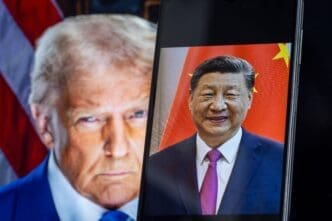Washington, D.C. – Amidst escalating tensions in the Middle East, President Donald Trump is contemplating military action against Iran, as the conflict between Israel and Iran enters its sixth day. This development comes after a series of aggressive exchanges, with Iran's Supreme Leader Ayatollah Ali Khamenei declaring "the battle begins" in a social media post, and President Trump responding with a call for Iran's "unconditional surrender."
According to sources, President Trump is increasingly considering the use of U.S. military assets to target Iranian nuclear facilities, moving away from diplomatic resolutions unless Iran agrees to certain concessions. This shift marks a significant change in the administration's strategy, as Trump previously attempted to negotiate with Iran.
On the ground, the situation is dire. Israeli air defenses have been active, intercepting Iranian missiles, while the Israeli Air Force has launched strikes on military targets in Tehran. Explosions have been reported in Tel Aviv and there are evacuation warnings in place. Iran, in retaliation, has launched missiles towards Israel, adding to the volatility in the region.
Complicating the geopolitical landscape, the United Arab Emirates has exempted Iranian citizens from overstay fines due to the regional airspace closures that have stranded many travelers. The conflict has also prompted Israel to initiate a program to repatriate citizens stuck abroad due to flight cancellations.
Russian interests are also in play, as the Kremlin monitors the situation. Despite its alliances, Russia stands to gain economically from the chaos in the energy-rich region, although it has not offered military support to Iran.
Meanwhile, U.S. intelligence agencies, including Director of National Intelligence Tulsi Gabbard, maintain that Iran has not resumed its nuclear weapons program, a point of contention with President Trump who argues otherwise. The U.S. has surged aerial refueling tankers to the Middle East, indicating a readiness to support potential military operations.
As the conflict intensifies, global diplomatic pressures mount. China has expressed concern over the escalating tensions, emphasizing the need for sovereignty and security in the region. Oil prices have surged to their highest levels in months, reflecting market anxieties over possible disruptions.
The U.S. Embassy in Israel has closed temporarily due to the conflict, advising its employees and their families to shelter in place. This closure underscores the severity of the situation and the potential for further escalation.
With the world watching, President Trump faces a critical decision that could reshape the Middle East's geopolitical landscape and test the limits of American military involvement abroad.






